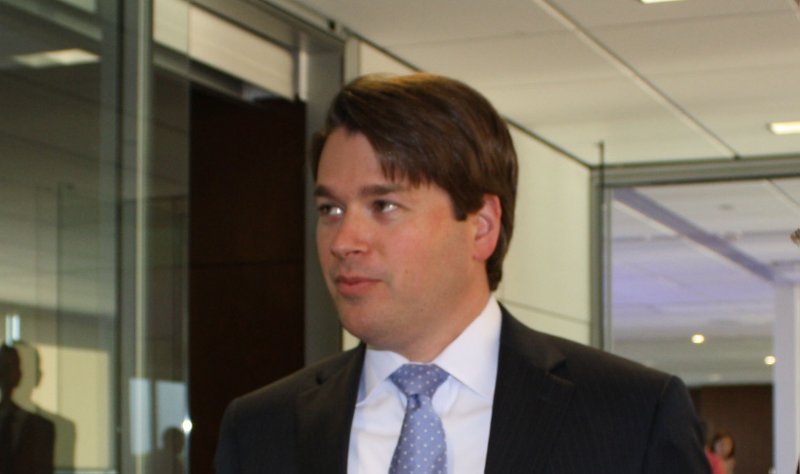The Arkansas Public Employees Retirement System's investments surged in value last quarter by $1.09 billion to a total $10.6 billion, an investment consultant told the system's board of trustees Wednesday.
The system's investment return was 12.28% in the quarter that ended Dec. 31, said Brianne Weymouth of the consultant Callan LLC.
During the board's meeting over Zoom, Weymouth said the system's investment performance last quarter was strong amid rising stock markets and ranked in the top 7% of its peers.
Over the past five years, the system's average rate of return was 10.54%, ranking it in the top 20% of its peers, Callan LLC reported.
The Public Employees Retirement System is state government's second-largest retirement agency, behind the Arkansas Teacher Retirement System.
The trustees decided Wednesday to set a 2% interest rate for members with deferred retirement plan balances in fiscal 2022, which starts July 1. System Director Duncan Baird said the system paid 2% interest on the balances in the current fiscal year.
He said paying 2% interest on roughly $90 million in deferred retirement balances would cost the system close to $1.8 million in fiscal 2022.
A bill has been filed that would extend the period for participation in the deferred retirement plan from seven years to 10 years, Baird said. He said he's waiting for a fiscal impact on the bill from the system's actuary. House Bill 1281 is sponsored by Rep. Les Warren, R-Hot Springs.
The system includes 44,373 working members with an average annual salary of $40,469 and 39,805 retired members with an average benefit of $16,003 a year as of June 30, according to its actuary.
State and local governments paid $299.4 million into the system in fiscal 2020, while system members contributed $71.4 million to the system, according to a system report.
As of June 30, the system's unfunded liabilities totaled $2.42 billion with a projected pay-off period of 23 years, according to the system's actuary. Actuaries compare unfunded liabilities to a mortgage on a house.
In the quarter that ended Dec. 31, the system's domestic stock market investments posted a return of 15.41% to reach $4.4 billion and its international stock market investments earned a return of 18.04% to end up valued at $2.7 billion, according to Callan LLC.
Last quarter, the system's bond investments earned a return of 2.46% to reach $1.6 billion and its diversified strategy investments posted a 7.02% return to end up at $491 million, Callan reported.
The consultant reported the system's real asset investments -- consisting of real estate, energy and timber investments -- earned a return of 6.03% last quarter to reach $1.2 billion.
The trustees later decided to change the composition of the system's real asset investments.
They voted to increase their target percentage of those investments for core real estate from 61% to 70% and for value-added real estate from 14% to 20%. They also voted to trim the share for public real estate investment trusts from 6% to a range of 0-5%.
The target percentage of real asset investments for energy stocks was cut from 13% to zero and for timberland was cut from 6% to 5%, but increased for farmland from zero to 5%.
Weymouth said the system didn't necessarily get diversification benefits from this particular energy stock exposure.
She said the system might invest in some farmland in Arkansas in the future.
As far as proposed legislation, Baird said the board's proposal to compute members' final salary compensation for calculating retirement benefits based on their five highest-paid years, instead of their three highest-paid years, will be changed to only apply to new hired members after July 1, 2022, instead of applying to all working members.
"That was really just based on the feedback that we received just really in the last few months, but also that the legislators, Rep. Warren and Sen. [Kim] Hammer, have received," Baird said. Hammer is a Republican from Benton.
"They really wanted the package to be something that there was broad agreement on," he said. "When we sat down and discussed everything, the [final average compensation bill] was the piece that had really some disagreement that could improved by changing it slightly."
The bill is House Bill 1346 by Warren, Baird said.
Baird said this change is in sync with House Bill 1347 by Warren, which also would apply to newly hired members after July 1, 2022. If they vested for retirement benefits, their cost-of-living adjustment on their benefits would be the lesser of 3% or the consumer price index for urban wage earners and clerical workers determined by the U.S. Department of Labor each year.
House Bill 1348 by Warren would increase the amount of pay contributed by working members who pay into the system -- now 5% -- by 0.25% a year, starting July 1, 2022, up to 7%.
